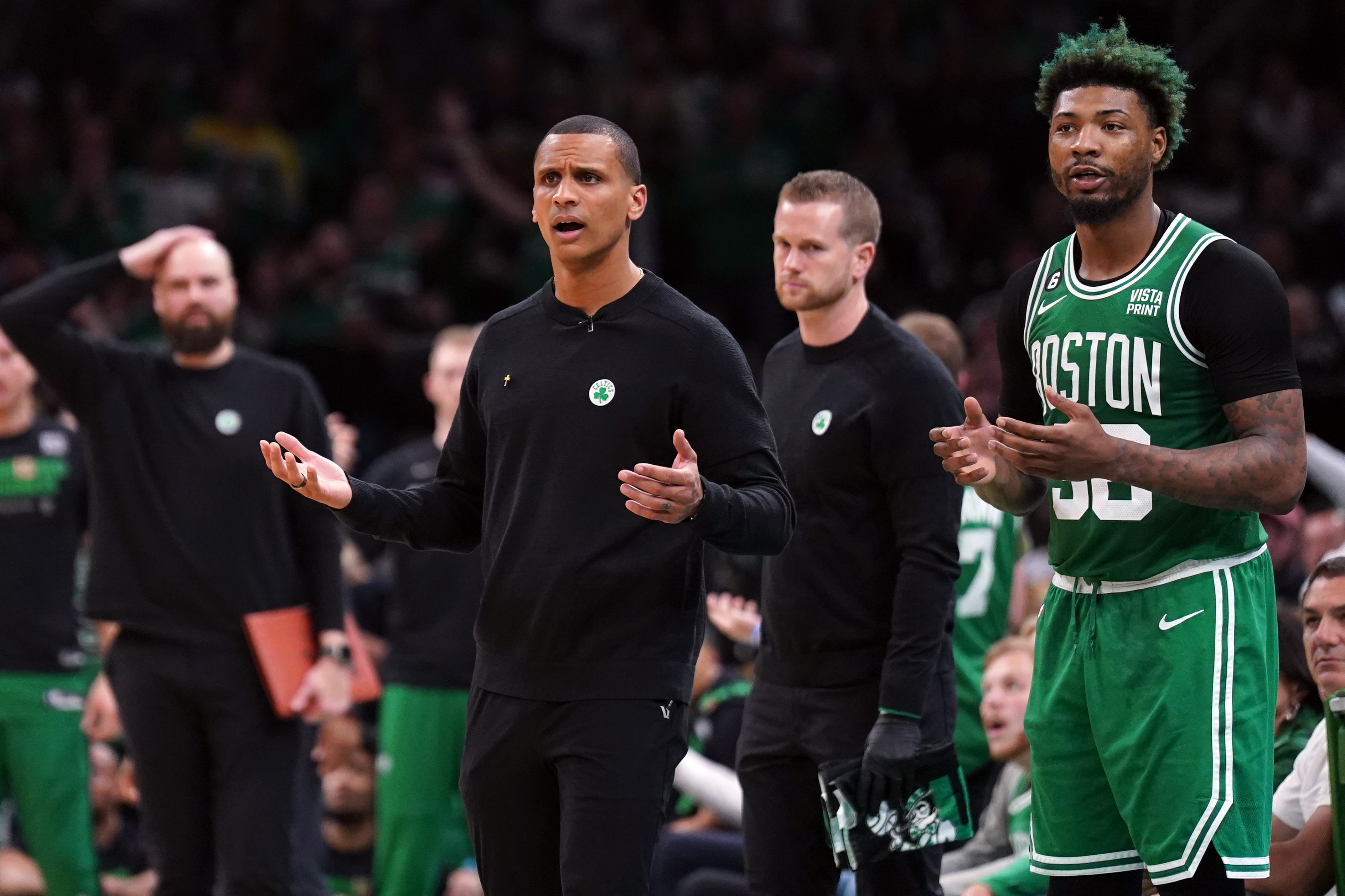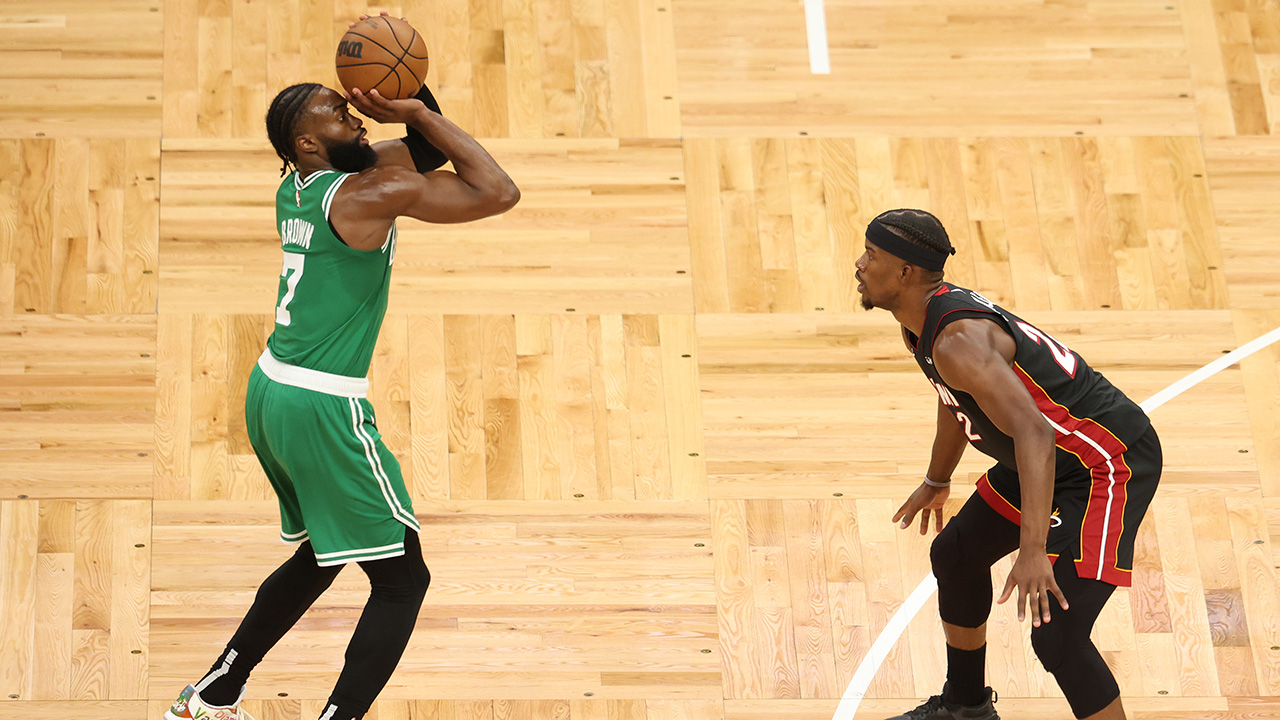BOSTON -- The end is always abrupt, even when it’s always looming.
The Boston Celtics’ season was on life support for more than a week, and yet no one quite seemed prepared for the shock of going from the highest of highs following Derrick White's Game 6 buzzer-beater to the lowest of lows in an embarrassing Game 7 beatdown inside TD Garden.
Inside a quiet Celtics locker room that cleared out quickly, there were a whole bunch of awkward hugs between players who spent the past eight months glued to each other’s sides on this championship quest, yet don’t know if they’ll be together again moving forward.
Stay in the game with the latest updates on your beloved Boston sports teams! Sign up here for our All Access Daily newsletter.
The Bus 1 Boys came to grips that there would be no more rides. Grant Williams had a trash bag full of gear slung over his shoulder as he departed before the team’s locker room even opened to reporters. Many of the team’s core players dressed quickly and rushed to the podium with an uncertain summer ahead.
Celtics Talk POSTGAME POD: Celtics can't complete the 0-3 comeback in all-around frustrating Game 7 loss | Listen & Subscribe
Even as most players dressed, said their goodbyes, and departed, Jayson Tatum sat at the far end of a quiet locker room, his left ankle plunged into a mop bucket filled with ice after turning that ankle in the opening seconds of Game 7. The Celtics never found an offensive rhythm after that, and Caleb bleepin' Martin and the Heat never missed a chance to stunt any of Boston’s fleeting momentum.
When Tatum got the podium, he was asked to reflect on missed opportunities for a team with championship-or-bust aspirations.
"S--- happens, and the past is the past," said Tatum.
Indeed, there is little use lingering on what could have been. Even with some very notable bumps in the road -- particularly before the start of the 2022-23 season -- the Celtics had all the talent necessary to get back to the championship stage. They failed. A season defined by its roller-coaster nature ended on a stomach-churning dive, and now the ride rolls into the dark tunnel that is an uncertain offseason.
What happens next? Here’s our best guesses on the biggest questions facing the Celtics this summer, all with a restrictive new collective bargaining agreement ready to complicate many of the team’s upcoming decisions:
Does Jaylen Brown get the supermax?
In the emotional aftermath of a maddening Game 7 in which Jaylen Brown turned the ball over eight times, it’s easy to stomp your feet and demand the Celtics explore trade options. Brown’s underwhelming play in the East Finals will overshadow an All-NBA season in which he showed encouraging growth. Brown had notable moments of regression in the postseason, which will leave some leery about offering him $ 295 million this summer.
We are not certain there’s a more agreeable path.
While much of Boston’s inability to fully maximize its opportunities in recent seasons falls back on its superstars, it's prudent to take a deep breath before you jump on the NBA trade machine to deal a 26-year-old Brown for any 30-plus-year-old scorer, or some collection of spare parts.
Yes, the NBA’s new CBA will make roster construction far more difficult as the Celtics ponder how to build around a Tatum/Brown core. Those two contracts eventually will eat up roughly 70 percent of the cap and force the Celtics to make tough decisions about how to spend available money without exceeding a new second apron that will strip the team’s ability to build (most notably, not being able to use a mid-level exception and complicating the path to make anything but a 1-for-1 trade for a player of lesser salary).
Here’s the thing: That’s a bridge you don’t have to fully cross for a couple more years. Brown's big-money extension wouldn’t kick in until next summer, and Tatum's the summer after that.
The Celtics absolutely would need to start getting their ducks in a row in order to remain competitive without enduring these punitive tax burdens. But those pain points are probably worth enduring to see if this core can write a storybook ending to its title quest. If you win a title in either of the next two seasons, then it gets a whole lot easier to worry about the potential pain points that await.
Now, Brown absolutely needs to continue evolving his game, particularly his ball security. But few were lamenting his flaws when he was the more consistent of Boston’s stars for stretches of the season.
If we’re president of basketball operations Brad Stevens, we’re putting the supermax in front of Brown as soon as allowed, hoping he’s committed to Boston despite his sometimes conflicted relationship with an antsy fan base, and figuring out the rest from there.
Does Joe Mazzulla return as head coach?
Joe Mazzulla deserves his fair share of blame for Boston’s inconsistent ways. He did not always put his team in the best position to succeed, nor did he always utilize his resources to save his players from themselves. He was stubborn when it came to timeouts, 3-pointers, and answering the most basic of postgame queries.
But unless the Celtics believe there is some sort of must-have free-agent coach who can better draw blood from the stone-stubborn core of this team, then we don’t see a huge value in bringing in a fourth coach in four seasons.
The more prudent path, from this view, would be rebuilding Mazzulla’s bench. The Celtics already experienced a talent drain when they lost Udoka, Will Hardy, and Damon Stoudamire over an eight-month span. When Mazzulla got vaulted to the big chair, and Boston did little to add experience to his support staff.
MORE CELTICS CONTENT
That is not a knock on Boston’s young staff. But Mazzulla’s staff was thin on experience and basically devoid of playing experience. It didn’t put Mazzulla in the best position to succeed.
We expect some of Udoka’s former assistants will follow their coach to his new job in Houston. The Celtics will have an opportunity to add more experience around Mazzulla. They can do something simple like add former Rockets coach Stephen Silas, who spent time in Boston after his dismissal.
But the Celtics should prioritize adding another veteran coach who has been through the grind of postseason play, and maybe a former player who isn’t afraid to apply some tough love when the superstars of this team go astray.
An odd man out in the backcourt?
If the Celtics remain committed to building around the Jays, there will need to be some tweaks to the supporting cast. That would include moving on from at least one of the guard trio of Malcolm Brogdon, Marcus Smart, and Derrick White.
The injury bug bit Brogdon at the worst time, but his defensive limitations were exposed in the postseason. His bulky salary might make it hard to move him as a positive asset, but if the Celtics need to trim money in this new CBA era, he’s seemingly the most likely of the group to get shopped.
White was spectacular for much of the season and seems the most likely to be a long-term part of this core. The front office will have conversations about Smart’s future but we suspect that the Jays want him along for the ride, even if Smart has his maddening moments.
Brogdon is set to make $ 22.5 million next season with two years remaining on his deal; Smart ($ 18.6 million next year) and White ($ 18.4 million) are on easier-to-digest pacts.
Does Grant Williams get priced out this summer?
The Celtics will almost certainly extend an $ 8.5 million qualifying offer to Williams this summer to make him a restricted free agent. Depending on their ability to move out one of their high-priced guards, the Celtics can afford to splurge somewhere up towards midlevel money to retain Williams if they view him as a priority for the core.
Al Horford’s salary slash as part of his new extension aids that process. But much of Boston's ability to keep Williams will hinge on whether he gets a bigger-money offer from another team. If a rival knows Boston is limited in the funds that it can apply, that team might be able to pry Williams away at a number that Boston simply can’t get to (maybe a starting salary in the mid-teens?).
How does the end of Boston’s bench change?
Danilo Gallinari has a $ 6.8 million player option that we’d assume he’ll trigger. The Celtics (kind of bafflingly) held onto him through the deadline despite an opportunity to use his contract to hunt big-man depth. They may need to right that wrong this summer rather than cross their fingers on the health of a soon-to-be 35 year old. Mike Muscala has a team option at a reasonable $ 3.5 million to help fill the Gallo role.
We all suspected the team might move on from Payton Pritchard after this season, but if Boston sends out someone like Brogdon, it could open the door for more regular-season minutes for Pritchard. The Celtics need to lean into Sam Hauser’s development, especially after watching Miami’s shooters punish Boston throughout the East finals.
Landing someone serviceable at No. 35 in this year's NBA Draft feels important for a team that keeps trading first-round picks to bolster the top half of the roster.
Adding a serviceable backup big man in the offseason also feels important given the health histories of Horford and Robert Williams III. Getting back some sort of serviceable size seems like it should be a priority if Boston moves out any of the higher-salaried guards.
While the Celtics have prioritized long-term contracts and organizational stability, the desire this summer could be shorter-term deals that promote enough room to maneuver when the CBA restraints really tighten as the Jays' salaries spike in the coming years.


